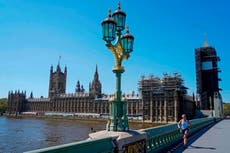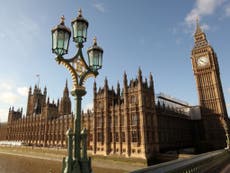Jacob Rees-Mogg calls for parliament by video-link during Westminster renovation works expected to last years
Report proposes dry dock in Thames to speed works on crumbling Palace of Westminster
Your support helps us to tell the story
From reproductive rights to climate change to Big Tech, The Independent is on the ground when the story is developing. Whether it's investigating the financials of Elon Musk's pro-Trump PAC or producing our latest documentary, 'The A Word', which shines a light on the American women fighting for reproductive rights, we know how important it is to parse out the facts from the messaging.
At such a critical moment in US history, we need reporters on the ground. Your donation allows us to keep sending journalists to speak to both sides of the story.
The Independent is trusted by Americans across the entire political spectrum. And unlike many other quality news outlets, we choose not to lock Americans out of our reporting and analysis with paywalls. We believe quality journalism should be available to everyone, paid for by those who can afford it.
Your support makes all the difference.Jacob Rees-Mogg has blown a massive hole in plans for the renovation of parliament, telling MPs they may have to meet virtually on a lockdown-style video link while the Palace of Westminster is closed for works which are expected to last six years or more.
The Leader of the Commons said that a £1.5bn scheme to house parliament’s two chambers elsewhere in Westminster, set out in a report today, were “for the birds”.
His comments came after Boris Johnson was accused of sending the project “back to square one” by suggesting last year that MPs could instead move to a temporary home in York.
Today’s report by the Restoration and Renewal Programme team found that moving MPs into a temporary chamber in Richmond House on Whitehall and peers to the nearby QEII conference centre remains “the most secure, cost-effective and practical solution” to keep parliament in operation while works take place.
It set out proposals to phase restoration work to minimise the time MPs are away from their historic home – including by creating a dry dock in the Thames alongside the Palace of Westminster to provide access for construction workers to the building from the river.
But it rejected proposals for MPs to remain in place while works go on around them, and said that even if the project is accelerated they will have to be away from their historic home for “years not months”.
Restoring the building while all MPs and peers remain on-site would cost billions of pounds more and take decades longer than temporarily moving out while work takes place, the report found.
But Mr Rees-Mogg said the proposal to move to temporary facilities in Westminster was not “sensible” at a time when the country’s finances are stretched by the Covid pandemic.
He suggested that proceedings could continue in the historic chamber during the renovation works, moving when necessary to a “hybrid” basis similar to that used in lockdown, with some MPs physically present, but most taking part by video link. It is understood he believes that hybrid arrangements would be needed for no more than a matter of a few months or a year.
The planned temporary chambers “can’t have been a sensible thing to do, even in less straitened financial times”, he told MPs. “In current circumstances, it seems to me to be for the birds.
“We have to focus on value for money. I am not the greatest advocate of hybrid proceedings ... but I’d rather have hybrid proceedings for a little bit where we couldn’t use this chamber than spend £1.5bn.
“We as members of parliament ... may have to put up with a little bit of discomfort, there may be occasionally a little bit of banging and noise being made. But the key work needs to be done and needs to be done in a timely fashion with value for money at its heart.”
Today’s report did not put a budget on the cost of works, currently expected to start in the mid-2020s.
But previous studies have put the price tag at anything between £3.5bn and £5.7bn – with one spending watchdog estimating that the eventual cost could be as much as £12bn.
The report warned that delay in starting work would add to the cost, as the 150-year-old building is “falling apart faster than it can be fixed”, with the cost of maintenance doubling in just three years to £127m a year in 2018/9.
Unions representing parliamentary staff are bitterly opposed to calls remaining in the palace while work is underway.
Prospect union deputy general secretary Garry Graham said: “The idea that parliament could be fully restored without evacuating MPs and staff was always a ridiculous obsession of a minority of politicians.
“We welcome the conclusion of this review that this option would pose an ‘extraordinary level of risk’ and hope that this bad idea can now finally be put to bed, after a large amount of time and public money has been wasted pursuing it.
“The risks of a potentially catastrophic incident at parliament will continue to rise if this vital restoration work does not commence as soon as possible.”
The chief executive of the Restoration and Renewal Sponsor Body, Sarah Johnson, said: “The iconic home of parliament is in urgent need of restoration. The review has found new ways of carrying out the complex project, focused on getting value for money, and we will continue preparing a detailed and costed restoration and renewal plan that will for the first time give parliament a true sense of the costs and timescales of restoring the Palace of Westminster.”
A government spokesperson said: “As an iconic part of our national heritage and the working home of the UK’s parliamentary democracy, the Palace of Westminster needs preserving and protecting from a catastrophic event like the fires which decimated Windsor Castle and Notre Dame.
“There can be no blank cheque for the necessary works so when parliamentarians are asked to approve a fully-costed proposal the focus should be on what is vital, not gold-plating.”





Join our commenting forum
Join thought-provoking conversations, follow other Independent readers and see their replies
Comments